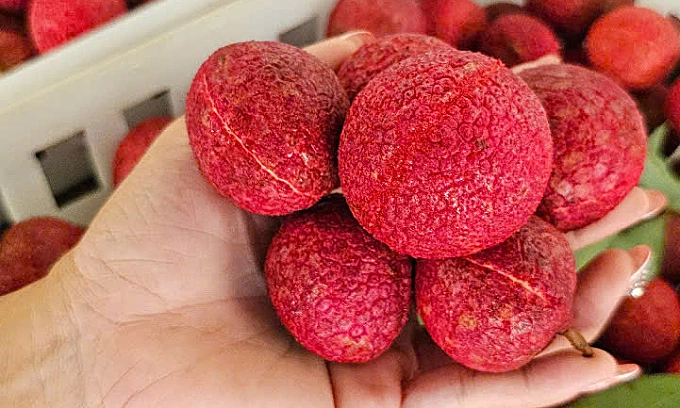The Rising Demand for Thanh Hoa Seedless Lychees Amid Supply Challenges
In the bustling urban landscape of Ho Chi Minh City, a delicacy from the north-central province of Thanh Hoa has captured the attention of discerning consumers: seedless lychees. Despite their steep price tag—nearly doubling over the past year to VND750,000 (US$29) per kilogram—demand continues to soar.
At a fruit shop in District 3 owned by Hanh, the scarcity of this prized fruit is evident. “This harvest, I could only procure 300 kilograms, and they sold out almost immediately,” she explained. Hanh emphasized that these seedless lychees are not just another fruit—they’re a rare treat. Customers must pre-order a month in advance and be prepared to pay a premium for the privilege.
Similarly, Tran Thi Ngoc Chau, who operates the Tam Ngoc Garden Fruit store in District 8, echoed these sentiments. Despite having connections with established traders, she managed to secure only a few tons of seedless lychees, which fell short of her customers’ overwhelming demand. Her clientele, primarily office workers and high-income individuals, praised the fruit’s unique qualities. “They come back raving about the pleasant sweetness and crisp flesh, placing even larger orders each time,” she noted.
The limited supply isn’t due to lack of effort or planning. Bui Duc Thuy, deputy director of Ho Guom – Song Am High Tech Agriculture, revealed that production in Thanh Hoa’s Ngoc Lac District dropped by 33% from 2024 to seven tons this year, largely due to adverse weather conditions and pest infestations. Of this yield, over 550 kilograms were exported to France, leaving domestic markets struggling to meet local demand.
Despite these challenges, there’s optimism on the horizon. The company, which currently cultivates a 40-hectare farm, aims to expand its operations to 200 hectares by 2030. Their commitment to quality is evident through certifications like VietGAP and GlobalGAP, ensuring both local and international standards are met.
Unique Characteristics of Seedless Lychees
Thanh Hoa’s seedless lychees distinguish themselves from traditional varieties in several ways. While maintaining a similar appearance, they either lack seeds entirely or have very small ones. Typically larger than regular lychees, a kilogram contains only 25–27 fruits compared to 30-35 in standard types. Their bright red skin encases thick, crisp flesh that doesn’t stick together like conventional lychee pulp. Additionally, they boast a lower sugar content, offering a lighter flavor profile without bitterness.
Market Dynamics and Future Prospects
According to the Ministry of Agriculture and Environment, large-scale cultivation of seedless lychees remains challenging due to specific climate requirements and advanced farming techniques needed for optimal growth. Currently, Vietnam and China are the primary producers, with harvest seasons concentrated around June-July.
Vietnam is strategically positioning itself in the global market, aiming to carve out a niche in the premium segment domestically and internationally. Although Vietnamese consumers also see imports of Chinese seedless lychees priced between VND600,000-700,000 per kilogram, the homegrown variety enjoys greater popularity. Consumers favor Vietnamese seedless lychees for their freshness, milder taste, and reduced bitterness.
As Vietnam continues to build a brand around its seedless lychee, the focus remains on quality and exclusivity. This delicate balance between demand and supply underscores the fruit’s status as a luxury item, cherished by those fortunate enough to experience its distinctive flavor.







